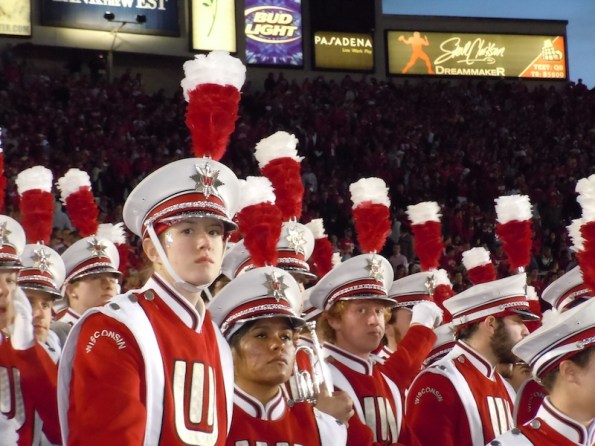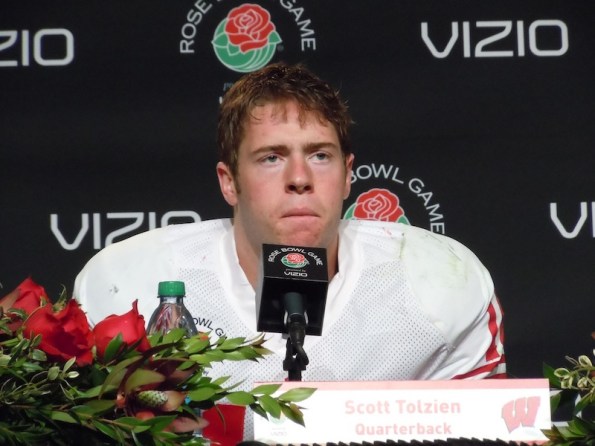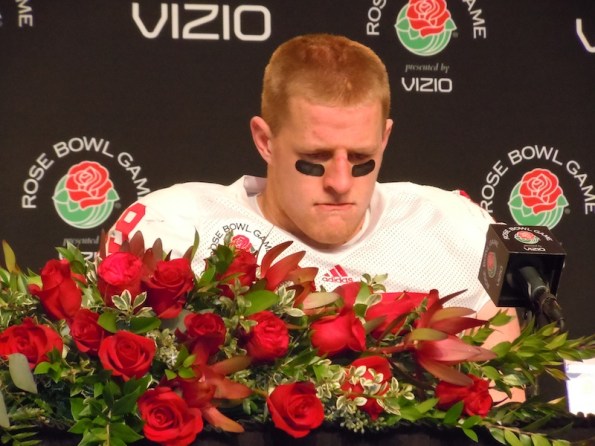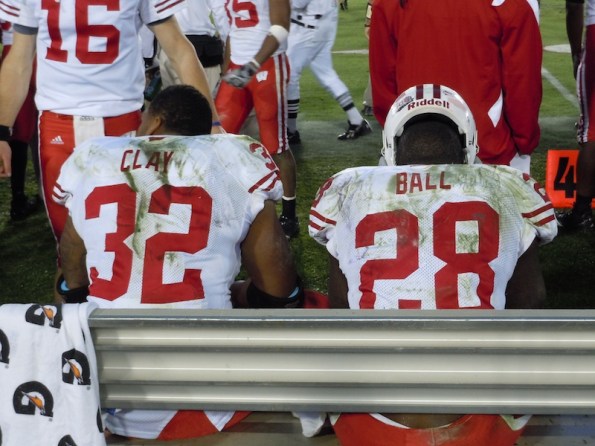Archive
Rose Bowl loss in photos
Rose Bowl loss an emotional one
PASADENA — Asked how tough a two-point loss in the Rose Bowl was to deal with, J.J. Watt took a moment before answering, trying to collect himself and his thoughts.
“We know how much this means,” Watt began before his emotions got the best of him.
Teary-eyed, Watt attempted to regain his composure and finish his answer.
“To everybody. To everybody involved,” Watt continued, his voice now audibly revealing the fact that he could not stop from crying. Another deep breath, as some sniffles now accompany the tears.
“We work 365 days a year for this,” Watt said, powering through the emotions, tears and sniffles. “And then we come out here and don’t execute, and we…”
Finally, it was all too much for the junior defensive end. Watt sat back, and covered his face, attempting to hide the tears streaming down from his eyes. For seven seconds, everyone in the room sat silent, watching the display of emotion from Watt, and waiting for him to finish his answer.
Watt did not, and could not finish his thought at that time. But he didn’t have to.
If there were any question about how devastating a two-point loss was after working so hard to get to the Rose Bowl for the first time in more than a decade, Watt’s tears made it clear.
The Wisconsin Badgers didn’t come to the Rose Bowl just for the experience, they came to win, and fell short of their goal.
“It’s pretty tough,” left guard John Moffitt said. “It’s not really something you can describe that easy. I mean, I don’t know. It’s tough.”
Moffitt, having played his final game in a Wisconsin uniform, summed the loss up pretty well, by not summing it up. How can you put into words the disappointment that comes from such a heartbreaking loss on such a big stage?
It wasn’t supposed to be this way. Despite TCU’s status as the three-point favorites, the Badgers were billed as big, bad BCS team ready to end the Horned Frogs’ run.
Cinderella stories, by definition, are supposed to end when the clock strikes midnight, not make the game-winning play on the two-point conversion well into the early morning hours.
But therein lies the problem, TCU is no Cinderella.
“Give all the credit in the world to TCU, that is not just lip service,” UW head coach Bret Bielema said in his opening statement. “That is a very good football team. They’re undefeated for a reason.”
Even so, that hardly takes the sting out of the loss for Wisconsin. They put together one of the best seasons in program history, but came up short when it mattered most.
They’ll always own a share of the 2010 Big Ten title, but the 2011 Rose Bowl belonged to the TCU Horned Frogs.
But through the disappointment and frustration, the tears and the anger, the Badgers remain focused, and focused on the same thing that got them to the Rose Bowl in the first place. Wisconsin is prepared to take this loss, evaluate it, learn from it, and get better heading into next season because of it.
Even Watt, who had broken down just moments earlier, was not going to sit and sulk.
“The Wisconsin Badgers will be back to the Rose Bowl,” Watt said definitively. “I haven’t made my decision, but if I’m back [or] if I go, the Wisconsin Badgers will be back to the Rose Bowl. I don’t know if it will be next year, but Coach Bielema is an outstanding football coach, the Wisconsin football program does things the right way, and Coach Alvarez leads the athletic department the right way.
“No doubt about it, the Badgers will be back. They’ll be back better than ever, and when they come back, they’ll win.”
Missed opportunities costly in Rose Bowl
PASADENA — Many times, in talking about what his team did to get to a share of the Big Ten championship and a Rose Bowl bid, Wisconsin head coach Bret Bielema went back to their Oct. 2 loss at Michigan State.
As he saw it, Bielema’s team managed an 11-1 record with big wins over then No. 1 Ohio State and on the road at Iowa because of what they learned from the Badgers’ loss to the Spartans. Had it not been for that game, they wouldn’t be where they are today.
Ironically enough, nearly three months later, the issues that cost Wisconsin in its only regular season loss were much the same problems they had in the Rose Bowl against TCU. The Badgers couldn’t get off the field on third down and left plenty of points on the board through missed opportunities in the close loss.
“I don’t think anybody can beat us but ourselves,” said left guard John Moffitt. “I think we beat ourselves today. We didn’t do what we needed to do.”
From the beginning — literally as Montee Ball ripped off a 40-yard run on the first play from scrimmage — the TCU defense struggled to stop the potent Wisconsin offense. It was the Badgers themselves that did most of the work in keeping points off the scoreboard.
Unfortunately for the Big Ten champions, they followed Ball’s big run — which brought them form their own 32-yard line to the TCU 28 — with a false start penalty on Nick Toon. When the drive came to an end, the Badgers put three points on the board on a 30-yard Philip Welch field goal, which came on 4th-and-8 at the 13-yard line.
On the previous play, Toon added a second mistake, dropping a pass over the middle. Had he not been called for the false start penalty, however, the Badgers would have been in a 1st-and-Goal situation on that series, rather than 1st-and-10 at the 15.
“What got us here was clean execution and clean disciplined football,” quarterback Scott Tolzien said. “We didn’t do that today all around, myself included.”
Tolzien, normally as efficient a quarterback as you’ll find, went just 12-of-21 for the game, passing for 159 yards while getting sacked twice.
On their first drive of the game, Wisconsin left a potential touchdown drive out there, but managed to salvage it with a field goal. When they opened the second quarter with another long drive, they weren’t so lucky.
After moving the ball down the field from their own 23-yard-line to just outside the red zone, Wisconsin faced 4th-and-3 at the TCU 22-yard line. Trailing 14-10, Bielema sent Welch out once again for the 39-yard attempt. He missed it, wide left, for another three points left on the board.
“I just think we missed out on a lot of opportunities that we had,” left tackle Gabe Carimi said. “It’s really just missed opportunities through and through.”
The missed opportunities and sloppy play were not limited to the offense, either.
A pass interference call on Devin Smith played a role in TCU matching Wisconsin’s early field goal with a 10-play, 77-yard touchdown drive that took less than 4 1/2 minutes off the clock.
Later, on what was perhaps the worst pass of the day from TCU quarterback Andy Dalton, free safety Aaron Henry couldn’t come up with what could have been a game-changing interception.
On the first play following Welch’s missed field goal, a pass intended for Jeremy Kerley went through Henry’s hands over the middle. While he broke up the pass effectively, it was a very catchable ball for Henry.
Whereas the Badgers continually missed out on opportunities and left plenty of points on the board, the Horned Frogs always seemed to make the right plays at the right time. In the end, that made a big difference in a game decided by just two points.
“It is definitely unfortunate man, but sometimes that’s just the way the ball bounces,” Henry said of the loss. “They made a few more plays than we did. But this team fought hard every step of the way, and hats off to my teammates. But TCU, they did a tremendous job and unfortunately, they just made a few more plays than we did.”
Gilreath ready to battle TCU’s Kerley
MADISON — Tiptoeing down the sideline after making a would-be tackler miss, Jeremy Kerley appeared to have run out of room at the 16-yard-line. No matter, he simply stopped in his tracks and headed left.
After backtracking a few yards to avoid another defender, Kerley found a huge hole and cut back through it to his right, finding the end zone on a 69-yard punt return touchdown.
When asked Sunday about that punt return, which came on Oct. 17, 2009 as TCU blasted Colorado State 44-6, Wisconsin head coach Bret Bielema admitted he had seen it several times, and could not think of a better one he’s seen.
“The thing that you see, which he has, with great returners it’s almost like they can see the field before it begins to happen,” Bielema said. “They can feel coverage and break to a certain part (of the field). I think it’s something that is a gift that’s just given to them.”
Kerley, a finalist for the Hornung Award, which is given to college football’s most versatile player, certainly would seem to have that gift. While he had not found the end zone on a punt return since that spectacular performance against CSU, Kerley has a big impact on every game for TCU.
On 30 punt returns this season, Kerley has picked up 388 yards for an average of just under 13 yards per attempt. That number is below his career average of 13.8 yards per return. Kerley also has 17 kickoff returns on the year, picking up an average of 28 yards. That number is actually higher than his career average of 27.3 yards on 35 attempts.
Within the TCU offense, Kerley has contributed 13 touchdowns, including two rushing touchdowns and a passing touchdown at Utah. He also has 50 receptions for 517 yards and 10 touchdowns.
“He’s a beast,” said senior David Gilreath. “I’ve been watching him for the last couple years.”
While he had high praises for his counterpart, Gilreath has done something Kerley has not: return a kickoff for a touchdown. Kerley does, however, have a 2-to-1 edge on punt return touchdowns.
Gilreath’s touchdown, a 97-yard sprint on the opening kickoff against Ohio State came just under a year after Kerley’s impressive punt return performance. While the win over the top-ranked Buckeyes was more impressive than TCU blowing out the Buffaloes, both scores sparked their respective teams in the victories.
“I’ll always remember it,” Gilreath said of his return. “I was just watching it on YouTube the other day. Somebody said something, and I was like, ‘Well, come check this out, man.’ I try to always give credit to the blockers because I ran, but that hole was huge.”
Just as Bielema admitted to seeing Kerley’s return several times, Gilreath acknowledged he’s watched himself start that game off with a bang many times in the last two months.
“I try to take myself back in the moment a little bit because I still think it’s unreal,” Gilreath said. “It went by so fast, and I look back watching it and it’s still unreal to think about how that happened in that moment against the No. 1 team.”
Both returners will be remembered for their thrilling return touchdowns, and both can change the momentum of a game with the ball in their hands.
While the true challenge will be on the Badgers’ coverage units to stop Kerley, facing another elite returner is an exciting challenge for Gilreath as well.
“Any time I get to go against a good return guy, I pride myself on competing against them and trying to have a better game,” Gilreath said. “No. 85 for Northwestern, he got me that game, but I try to compete out there and see what I can do against another good returner.”
As he referenced both Kerley and Venric Mark of NU, Gilreath called them both by number: No. 85. It just so happens that the same number appears on his jersey as well.
Is the key to return success, as he sees it, having an ’85’ on your jersey?
“Yeah, yeah, pretty much,” Gilreath answered with a smile. “That’s the key.”
Ball would be starting running back right now
MADISON — One of the biggest debates since the Badgers earned a Rose Bowl berth has been focused on the distribution of carries among three running backs.
Do you go with what’s working in Montee Ball and James White? Or do you rely on your veteran running back John Clay, who just happens to have a Big Ten offensive player of the year award to his credit?
Wisconsin head coach Bret Bielema may have answered those questions Sunday night, when he met with reporters.
“Right now, Montee would be our starting running back,” Bielema said, matter of factly. “John has to wait for a few other guys to get in. Montee’s playing as good of football as anybody. No question.”
Well that sure seems to clear things up. Or does it?
With three weeks remaining until the Rose Bowl, it would not be out of the question for Bielema to change his mind and put Clay in the No. 1 spot. After all, he did say “right now” when referring to Ball as his starter.
While all three running backs have clearly expressed their support for one another, they never stop competing for carries. The idea that they have to work in practice to touch the ball in the game is not lost on the players either.
“I’d like to get my spot back, like how we were in the beginning of the year,” Clay said. “But I’ve just got to work for it. The guys played a heck of a few games when I was out, so I’ve just got to prove it again.”
Another thing that people can’t help but notice when looking ahead to the matchup with TCU is the potential for Wisconsin to have as many as three backs with 1,000 yards rushing on the year.
“Hopefully we can all get to it in this Rose Bowl game,” White added. “I don’t think any school’s ever done that before.”
White leads the way with 1,029 after another big performance against Northwestern, with Clay and Ball not far behind. Even after missing so much time, Clay needs just 64 yards to give the Badgers a second 1,000-yard rusher.
Ball’s chances aren’t as strong, but 136 yards certainly is not out of the question for the sophomore. When you consider he’s rushed for 127, 167, 173 and 178 yards against Purdue, Indiana, Michigan and Northwestern, it would almost be a surprise for Ball to come up shy of the mark.
Add his apparent status as the starting running back and his chances certainly improve even more. It’s not really something that he’s focusing on, though.
“First and foremost, the goal is to come out with a victory,” Ball said. “But it wouldn’t be a bad thing to crack 1,000. It’s definitely something that’s in the back of my mind and it’s going to motivate me to run even harder.”
In an ideal scenario, a big first half by Clay and the Badgers could give Wisconsin a big lead, with two of three backs over 1,000 yards on the year.
If that were to happen, how would those two running backs feel about deferring to Ball, to let him become the third to reach the milestone?
“Oh yeah, get his 1,000 yards, too,” Clay said. “He worked hard this whole season, so we might as well feed him the ball.”
Bielema was not so quick to embrace the idea of boosting Ball’s carries to get him to the 1,000-yard mark.
With his focus on winning, and not just playing in, the Rose Bowl, he expected to do whatever was needed to win.
“It’s obviously very attainable, but it’s not on our game plan list,” Bielema said. “The awards we’re getting and the recognition we get is a byproduct of what we do, and that’s going to be one of those same things.”






You must be logged in to post a comment.